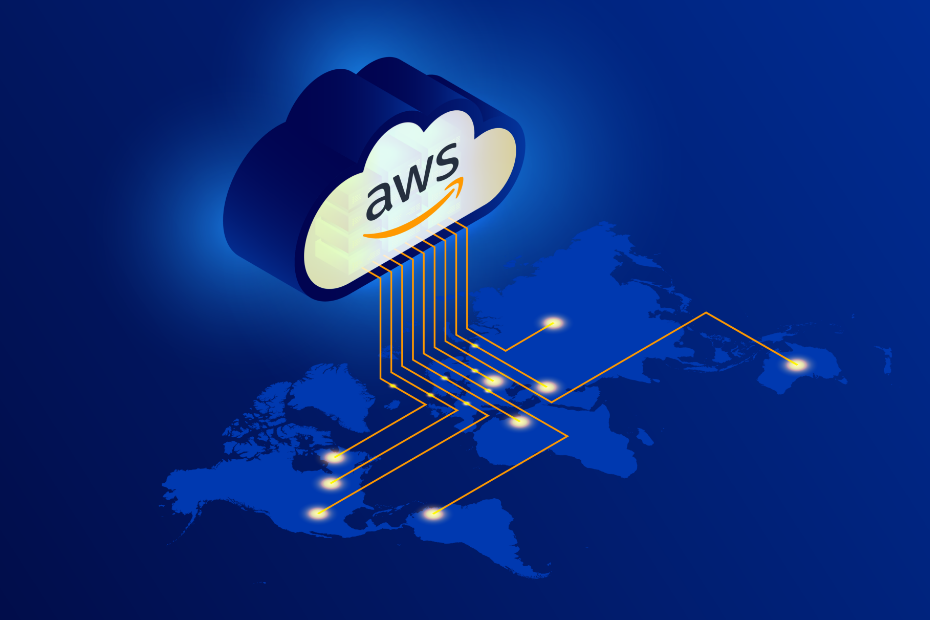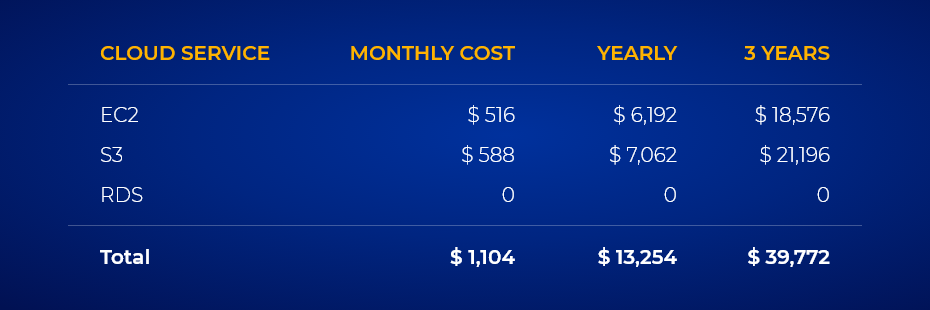
Amazon Web Services (AWS), the cloud wing of the ecommerce giant, leads the cloud computing market with a 33% market share and powers applications that are an integral part of our digital lifestyle. In 2020 alone, companies like Netflix, Twitch, Facebook, Instagram, and LinkedIn paid an amount exceeding $100 million in AWS bills. Organizations rely on AWS to build IT infrastructures, configure public and private networks, run platforms, and power business applications.
AWS leads the market in terms of global availability, number of cloud services, pricing model, and payment options.
In contrast to on-premises solutions and hosting services providers, AWS customers are ready to go in minutes and can run every component of an application entirely in AWS using its vast suite of services.
What is cloud computing?
Cloud computing is a rapidly growing and evolving technology that has revolutionized the way we interact with online applications and services. At its core, cloud computing refers to the use of remote servers hosted over the internet to store, manage, and process data. This allows users to take advantage of a wide range of features and capabilities that would not be possible on their own local devices alone.
SaaS (Software as a Service), the common method of software distribution, leverages cloud computing platforms to function. By hosting application code at their data centers, cloud platforms allow access to the application anywhere at any time via a web browser.
Another key element of cloud computing is IaaS, Infrastructure as a Service. IaaS enables users to have more control over their IT infrastructure without having to make large upfront investments in hardware and/or IT support services. Through IaaS platforms such as AWS or Azure, businesses can run everything from simple blog sites to massively scaled data warehouses across an extensive network of remote servers maintained by an expert.
Read on: Multi-Cloud: What Does It Mean For Your Organization?
How does AWS work?
Amazon Web Services (AWS) is a cloud computing platform that enables users to access on-demand compute and storage resources. It is designed to provide users with scalable, pay-as-you-go resources that can be rapidly deployed and easily managed.
AWS: Products, tools, and services
Whether you’re hosting a simple website, deploying an enterprise-wide business application, or simulating real-world models for research purposes, AWS has the products, tools, and services to get you started in no time. Organizations may need more than one cloud service from AWS to build their application stack. For example, Amazon Elastic Compute Cloud (EC2), Amazon Simple Storage Service (S3), and Amazon Relational Database Service (RDS) are the core components of most AWS implementations.
EC2 provides users with on-demand access to virtual machine instances, which can be used to run applications and services. S3 provides a scalable storage solution for data, while RDS offers a managed relational database service.
AWS offers its services in around twenty product categories, which include networking, machine learning, analytics and security, identity, and compliance in addition to compute, database, and storage. Here are some of the most common AWS services:
- AWS CloudFront: Amazon’s content delivery network used by web applications such as Prime Video, Spotify, and Netflix.
- Amazon Elastic Container Registry: AWS lets you store, share, deploy, and remove Docker containers without getting into infrastructure chatter.
- AWS Lambda: Serverless computing in AWS is powered by Lambda functions.
- AWS CloudWatch: AWS’ integrated solution for monitoring application performance.
- Amazon Identity and Access Management (IAM): Industry’s gold standard for safeguarding data from internal threats. This is key to the compliance with laws.
- Amazon SageMaker: SageMaker is the fastest way to build, train, and deploy machine learning models.
Price of AWS
The price is one of the most important factors to consider when deciding whether or not to use a service like Amazon Web Services. AWS offers a wide range of products and services, each with its own unique pricing structure. Some services, like storage and data transfer, are priced based on volume while others charge varying rates depending on computing power and memory requirements. To determine whether or not AWS is the right choice for your needs, it is essential to look closely at the cost of each individual service.
We ran price estimations with AWS TCO tools for a typical SME setup with an on-demand instance consisting of 32 vCPUs and 128 GB RAM, 40TB/month of standard storage, and 350 hours access to relational database. Here are the costs:

With cloud pricing, you must strike a balance between cost and the features that work best for your project or business. By doing so, you can ensure that you get the most out of Amazon Web Services without spending more than necessary.
Amazon Web Services certifications, courses, and tutorials
Whether you are a startup or an SME, you may need the assistance of Amazon Web Services certified engineers to make the most of your AWS journey from planning to deployment. The availability of certified AWS engineers is critical to the success of your cloud adoption efforts and there are a number of ways to acquire them.
You may train your staff to get certified. There are a wide variety of options available including courses, tutorials, and hands-on training programs that will help them prepare. An AWS certification examination costs upward of $200.
There are all sorts of AWS certifications available. You may get them certified in AWS basics all the way to distributed database systems depending on your requirements.
A more practical approach to getting certified resources faster is to hire an AWS certified engineer in the discipline you’re seeking expertise in. Training and certifying your employees will take time and most AWS certifications are tiered. For example, at Rare Crew, you may hire AWS certified engineers in a variety of disciplines.
Read on: Rare Crew's Tech-Savvy Software Development Services Catch GoodFirms' Attention.
However, there are other notable cloud platforms too.
Competitors of AWS
AWS vs Microsoft Azure
AWS is more flexible than Microsoft Azure. With AWS, you can choose from a wide range of instance types, storage options, and networking features. This gives you the ability to tailor your environment to your specific needs. Azure is less flexible than AWS but does offer some unique features that may be appealing for certain workloads. For example, Azure App Service lets you easily deploy and scale web applications.
AWS is more expensive than Azure. However, AWS offers a number of discounts and pricing options that can help reduce the cost of using the platform. For example, you can use reserved instances to save up to 50% on your compute costs.
Azure is easier to use than AWS. One of the biggest complaints about AWS is that it can be complex and difficult to use. Azure has made significant strides in terms of user experience.
Read on: How Can You Save Up To 65% On Your Cloud Costs?
AWS vs Google Cloud
AWS is more widely used than Google Cloud with almost three times as many users. This means that there's more support available for AWS, and more companies are familiar with it. However, Google Cloud is growing rapidly and is expected to catch up to AWS within the next few years. Secondly, AWS offers more services than Google Cloud, meaning you're more likely to find everything you need on AWS. In general, Google Cloud is slightly cheaper than AWS, although the exact price will depend on the specific services you use.
Overall, AWS is better for most businesses unless you have specific requirements, as that is where Google Cloud has the obvious advantage with managed Kubernetes services and big data analytics.
Is AWS the right fit for your business?
AWS is currently the market leader in cloud computing, but Microsoft Azure and Google Cloud are rapidly catching up. Each have unique strengths that businesses should consider when deciding which platform to use. AWS has more services to offer, but Microsoft Azure and Google Cloud have some unique features that could be important for certain businesses.
In the segment of managed cloud services space, Rare Crew offers clients an elite team of AWS certified engineers. Our aim is to help organizations navigate through all aspects related to their choice and implementation process for this cutting-edge technology like no other.
Read on: Clutch Applauds And Ranks Rare Crew Among Top Slovakian Developers For 2021.
